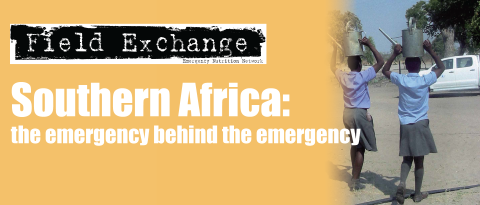A boy’s story from Swaziland

By Hlengiwe Nsibandze, FAO Swaziland
Like all sub-Saharan countries, the adverse effects of HIV/AIDS are undermining the future social and economic success in Swaziland. Situated in the heart of rural Swaziland lies the tiny town of Mahlangatja, in the highveld. Hidden away from modernisation and industrialisation, Mahlangatja is home to Maswazi Vilakati. At 18 years he is the oldest amongst a family of six. His father passed away in 1999 due to a /AIDS related illness. His mother sadly died the following year, also of an AIDS related illness. The sad story continues as Maswazi's uncle, who had taken care of him by way of paying for his schooling, also passed away shortly thereafter. This is when the harsh realities of life dawned upon this young man. With no source of income, he was forced to drop out of school in 2004 whilst still attending primary school. He was forced to seek refuge at his grandmother's homestead. Here he stayed with 30 of his grandfather's children who were borne by two wives. These were rough times, as they would sometimes go to bed having eaten dry porridge on its own.

Maswazi in his vegetable garden
Today Maswazi has a smile on his face thanks to the introduction of the Junior Farmer Field and Life School in Mahlangatja. He has been empowered with life skills and agricultural knowledge through this project. He has learnt to grow vegetables and can identify various crop diseases and prevention methods. His granny is delighted that he is part of such a positive venture as they are now able to have vegetables regularly and excess produce is sold to generate much needed income to cater for other household needs.

Maswazi shows off some of the produce of his garden at home with his family
Maswazi is proud of his garden and tends to it as early as 9am daily. This has led to other children being interested in the project. The life skills he has gained have taught him to respect his elders and the effects of HIV/AIDS. He feels more needs to be done to educate the population about the pandemic. When asked if he is sexually active, he responded by saying he is too young and that he is instead more interested and focused on becoming a successful largescale farmer. His immediate dream is to have the best garden in his area. He grows cabbages, beetroot, onions, and tomatoes.
The facilitators are proud of Maswazi's progress. The JFFLS was only implemented early this year in Mahlagatja yet, in such a short space of time, it has produced mind bogglingly positive results.
Beneficiary children

Austin is 16 year old and lives with his grandmother and extended family. He likes working on his vegetable plot but described water as a big problem, with often a queue forming at breaktime to get water. He waters his vegetables before school at 0830 am and after school. He is growing tomatoes, spinach and cabbage.

Cynthia is 20 year old and lives with her grandparents. Her brothers and sisters live with her father. Her plot is doing very well as she waters it often and also uses fallen leaves as compost on the site. She would like to visit other JFFLS sites to see how other children are working.

Mary (drawing water at the well) is a 16 year old orphan and lives with her older sister and her sister's husband, her sister's four children (aged 4-14y) and her cousins. She is drawing water for her vegetable plot during her lunch break. Three of her friends, Gertrude (16y), Philomena (13y), and Brenda (15y) who are not OVCs are helping her.

James M. Muchila, new patron of the JFFLS at Seim Nujoma Combined School, Kebbe
Imported from FEX website


